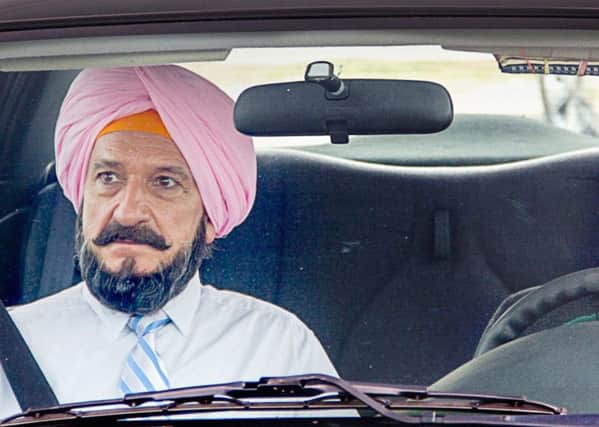Film preview: Learning to Drive


“I hope that I’ve been useful on a film set. I never worked with Spencer Tracy – he died before I became an actor – but he had a wonderful saying: ‘make the other guy look good’.”
Sir Ben Kingsley, whose latest film Learning to Drive in which he co-stars with Patricia Clarkson, opens in the UK this week is ruminating on his long journey through film, television and theatre. He laughs when he remembers the opening night in London of A Smashing Day, the musical that he co-wrote and narrated, and which prompted John Lennon and Ringo Starr to comment that he should pursue music “or you’ll regret it for the rest of your life”.
Advertisement
Hide AdAdvertisement
Hide Ad“Later I had my own little band,” he says. “We used to record programmes for the BBC – a programme called Northern Drift. Very Dylanesque, totally ripped off. Music has always been a tool that I can use but it’s never been a mainstream obsession.”
Kingsley’s passion became acting, first via the Royal Shakespeare Company and then in a succession of jobs on TV and the stage. There was a blip and a quick film role in Fear is the Key in 1972 but movie stardom eluded him until Richard Attenborough cast him as Mahatma Gandhi.
The road to Gandhi and the many other films that followed – among them Schindler’s List, House of Sand and Fog, Sexy Beast, Death and the Maiden and Hugo – is something that Kingsley puts down to the guidance of others.
“If your motives are pure, the angels will come,” he says simply. When asked to elaborate he talks convincingly of what he describes as the “unseen forces” that have influenced his working life.
Advertisement
Hide AdAdvertisement
Hide Ad“The unseen forces are sometimes joining the dots for me, which is quite extraordinary,” he says.
Perhaps the best example is when he was asked to see Richard Attenborough, then struggling to find his leading man for Gandhi. At the time Kingsley was reading a biography of Gandhi, and told Attenborough so.
“He was holding his hands together, he looked up and said, ‘Of course you are, darling.’ He was surrounded by the same number of coincidences. It was as if he was being prodded about by unseen forces, guiding him.”
A dozen years later Kingsley was playing a chess grand master in Searching for Bobby Fischer when he was handed a copy of Thomas Keneally’s book Schindler’s Ark. A day later he was contacted about a role in the film based on it.
Advertisement
Hide AdAdvertisement
Hide AdHaving been invited to play Itzhak Stern in Schindler’s List, Kingsley met with Steven Spielberg to discuss the man’s character and his motivations.
“I’d already played Simon Wiesenthal [in 1989’s Murderers Among Us] and I was frightened of another Holocaust film. I said to Steven, ‘What do you want me to do? I had my own answer at the back of my head. He used the word ‘witness’; I said ‘conscience’. And we shook hands.”
During the filming of Schindler’s List, Kingsley kept a photograph of Anne Frank in his pocket. Periodically he’d take it out and speak to the face in the picture, saying, ‘I’m doing this for you’. Seven years later he was asked to play Otto Frank, Anne’s father, in a TV movie.
Kingsley prides himself on accepting roles on either side of the moral or ethical fence. He has a nice side-line in gangsters, ranging from the real-life Meyer Lansky in Bugsy to the caricature of Renzo Locatelli in Parting Shots. But the man whose presence sends chills down everyone’s spines is psychotic Don Logan in Sexy Beast. “Don’t get me started,” utters Kingsley, effortlessly conjuring Logan’s East End tones from the back catalogue of his memory. “He’s Iago, absolutely. He’s what the academics call an heroic villain. Don is of that same mould. The script read like a Jacobean tragedy. It’s almost in verse. We didn’t change one word. There was no improvisation.
Advertisement
Hide AdAdvertisement
Hide Ad“My key to Don’s incessant barking, like a Rottweiler, and his lovelessness, [was that] Don Logan is an abused child who has never been healed. That rage as the years go on will multiply and multiply and multiply until it will finally take lives with it. Adolf Hitler was an abused child. He went on to lay waste to Europe.”
He balances the creation of monsters like Don Logan with his empathy for others. He remembers a comment, in her kitchen, from his grandmother, that Hitler should have killed all the Jews. He was 12. The sledgehammer effect of it never left him. Years later he was able to express the screaming in his head that had been suppressed in the kitchen. Some years ago he addressed the Holocaust Museum in New York. He remembers a tiny, elderly woman moving amongst the audience. “She rested her frail hand on my arm… and there was the tattoo on her wrist. Her number from Auschwitz.
“She said, ‘I lost all my family in the Holocaust. I have no living family. But listening to you now, I feel I have a family.’ That’s what you have to do as an actor: you have to be massively empathetic.”
Kingsley traces his epiphany back to a movie entitled Never Take No for an Answer in which Peppino, an orphan, takes his sick donkey into the Vatican in search of a cure for his ills. Sixty years after watching it, the memories still burn bright. “I think that we are very impressionable, like clay, when we are young. And hopefully we will stay malleable all our lives. I am still clay. My experiences have sharpened in me an urgency for the child in me, which is still here, to be seen and heard.”
Learning to Drive (15) is on nationwide release.